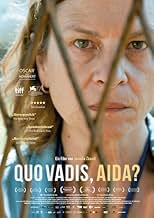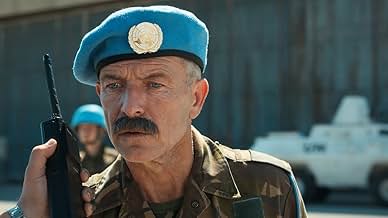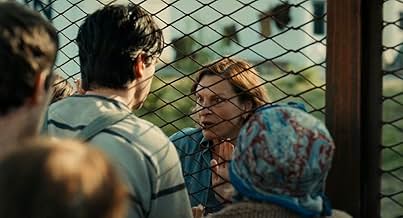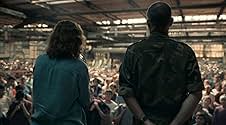IMDb RATING
8.0/10
41K
YOUR RATING
Aida is a translator for the UN in the small town of Srebrenica. When the Serbian army takes over the town, her family is among the thousands of citizens looking for shelter in the UN camp.Aida is a translator for the UN in the small town of Srebrenica. When the Serbian army takes over the town, her family is among the thousands of citizens looking for shelter in the UN camp.Aida is a translator for the UN in the small town of Srebrenica. When the Serbian army takes over the town, her family is among the thousands of citizens looking for shelter in the UN camp.
- Director
- Writers
- Stars
- Nominated for 1 Oscar
- 40 wins & 42 nominations total
- Director
- Writers
- All cast & crew
- Production, box office & more at IMDbPro
Summary
Reviewers say 'Quo Vadis, Aida?' is a powerful, harrowing film about the Srebrenica massacre, praised for impactful storytelling and strong performances, especially Jasna Duricic as Aida. It critically examines the United Nations' failure and explores themes of war and survival. While lauded for emotional depth and historical significance, some criticize perceived inaccuracies and over-dramatization. It is considered an important, though challenging, film that highlights a significant historical event.
Featured reviews
*Why this film*- This was nominated for the 2021 Best Foreign Film Academy Award, which it lost to Another Round.
Also, I am reading America and the Problem of Hell - an account of genocides of the 20th century. The last genocide that the book extensively talks about, is of the Bosnian Muslims by the Serbians, at Srebrenica. This is set smack in the middle of that tumultuous time.
*What I liked about it* - The pacing and the scripting. It is 100 minute long and packs so much in that century. The chief protagonist, Aida, a UN translator, might be the one of the most true flesh-and-blood characters written for screen. Her personal and professional battles form the crux. The UN soldiers, tasked with enforcing truce between the Bosnians and the Serbs and the Serbian warlords, intent on capturing the city and relocating its citizens are vividly drawn. The acting is so natural that you feel at times that you are watching a documentary, rather than a thriller.
It reminded me of our very own _The Kashmir Files_ at times. The terror that you are being hunted just for your religious identity, is as real here, as it was there. The brutality, much of it off screen here, would make your fertile imagination churn up many scenarios. It is telling that this was sent to the Academy Award by the country whereas The Kashmir Files was reviled by a section of the intelligentsia and political class as conjecture and not fact based.
This is a great film and is surely going to be seared in the memories of those who choose to watch it.
Also, I am reading America and the Problem of Hell - an account of genocides of the 20th century. The last genocide that the book extensively talks about, is of the Bosnian Muslims by the Serbians, at Srebrenica. This is set smack in the middle of that tumultuous time.
*What I liked about it* - The pacing and the scripting. It is 100 minute long and packs so much in that century. The chief protagonist, Aida, a UN translator, might be the one of the most true flesh-and-blood characters written for screen. Her personal and professional battles form the crux. The UN soldiers, tasked with enforcing truce between the Bosnians and the Serbs and the Serbian warlords, intent on capturing the city and relocating its citizens are vividly drawn. The acting is so natural that you feel at times that you are watching a documentary, rather than a thriller.
It reminded me of our very own _The Kashmir Files_ at times. The terror that you are being hunted just for your religious identity, is as real here, as it was there. The brutality, much of it off screen here, would make your fertile imagination churn up many scenarios. It is telling that this was sent to the Academy Award by the country whereas The Kashmir Files was reviled by a section of the intelligentsia and political class as conjecture and not fact based.
This is a great film and is surely going to be seared in the memories of those who choose to watch it.
The film covers the topic on Srebrenica genocide, which was committed in 1995 in Bosnia. It is portrayed through a family story, with Aida, a translator for the UN, as the main character.
A sad, but an important lecture on what hatred can make people do.
... because you never learn! The despicable, diabolical and disgusting events from Srebrenica, replayed many times before, currently playing out in several countries now, and quite probably for the foreseeable future while we continue to turn a blind eye, ignore, disengage or perhaps don't care. Jasna Djuricic as Aida, immense!
So horrible so horrible...
A war movie about the Srebrenica massacre in 1995. A mother, who's also an interpreter, tried to get her family to safety while the civilians were being transported by the Serbian force.
Coming in, I didn't know anything about the real life story. However, after watching about 10 to 15 minutes, it was abundantly clear what was going to happen. For the rest of the movie, it became a desperate, maddening, and heartbreaking descend into the inevitable. This was shown through the lens of our main character, and her desperation was relatable, like if you were in her shoes you would do everything she did.
The color and cinematography also heightened the desperation. The movie looked monotonous. The overwhelming color of the ground during the day felt hot, dry, and reflected the dire situation the civilians were in. Even more, the movie felt so raw, making me feel like I'm actually there with the people.
And then the ending hit. I knew it was coming, but still I was in silence as the camera slowly moved away. There's no need for showing actual violence. Just the sound was enough to convey the horror. The last scene was a strong testament of the director about the unjust event.
Overall, a devastating movie that i would not want to see again. 9/10.
A war movie about the Srebrenica massacre in 1995. A mother, who's also an interpreter, tried to get her family to safety while the civilians were being transported by the Serbian force.
Coming in, I didn't know anything about the real life story. However, after watching about 10 to 15 minutes, it was abundantly clear what was going to happen. For the rest of the movie, it became a desperate, maddening, and heartbreaking descend into the inevitable. This was shown through the lens of our main character, and her desperation was relatable, like if you were in her shoes you would do everything she did.
The color and cinematography also heightened the desperation. The movie looked monotonous. The overwhelming color of the ground during the day felt hot, dry, and reflected the dire situation the civilians were in. Even more, the movie felt so raw, making me feel like I'm actually there with the people.
And then the ending hit. I knew it was coming, but still I was in silence as the camera slowly moved away. There's no need for showing actual violence. Just the sound was enough to convey the horror. The last scene was a strong testament of the director about the unjust event.
Overall, a devastating movie that i would not want to see again. 9/10.
Nominated for Best International Feature Film at the last Oscars, Quo vadis, Aida follows a UN translator's plight to save her family from imminent death in the wake of Bosnian War and also covers the events that led to the Srebrenica massacre. A powerful, heartbreaking & devastating account of human injustice & global apathy, this Bosnian war drama is one of the best films of its year.
Written & directed by Jasmila Zbanic, the drama centres around a fictional family in the middle of a real-life conflict but through their predicament, it effectively captures the utter despair & helplessness the refugees faced, not only from their persecutors but also from their supposed saviours. Zbanic lays bare the grave incompetence of United Nations whose lack of action only ended up enabling the wholesale killings.
Zbanic makes sure the family the story focuses on looks & feels as real & authentic as possible, and the drama she conjures around them is compelling throughout. It's disturbing to watch UN delegates failing to do the one thing their organisation exists for and how they simply stood aside as mere spectators after letting the fox into the henhouse. Jasna Duricic leads from the front with an outstanding performance and she is strongly supported by the rest.
Overall, Quo vadis, Aida is a brutal, harrowing & profoundly upsetting example of its genre that provides a scorching account of the lifetime of pain & trauma that warfare leaves behind and also exposes the failure & indifference of the international council that indirectly pave the way for such atrocities. Bringing the horrors of Srebrenica to screen with cut-throat intensity and leaving us shattered with its gut-punching finale, this Bosnian war film is essential viewing by all means. In a word, unforgettable!
Written & directed by Jasmila Zbanic, the drama centres around a fictional family in the middle of a real-life conflict but through their predicament, it effectively captures the utter despair & helplessness the refugees faced, not only from their persecutors but also from their supposed saviours. Zbanic lays bare the grave incompetence of United Nations whose lack of action only ended up enabling the wholesale killings.
Zbanic makes sure the family the story focuses on looks & feels as real & authentic as possible, and the drama she conjures around them is compelling throughout. It's disturbing to watch UN delegates failing to do the one thing their organisation exists for and how they simply stood aside as mere spectators after letting the fox into the henhouse. Jasna Duricic leads from the front with an outstanding performance and she is strongly supported by the rest.
Overall, Quo vadis, Aida is a brutal, harrowing & profoundly upsetting example of its genre that provides a scorching account of the lifetime of pain & trauma that warfare leaves behind and also exposes the failure & indifference of the international council that indirectly pave the way for such atrocities. Bringing the horrors of Srebrenica to screen with cut-throat intensity and leaving us shattered with its gut-punching finale, this Bosnian war film is essential viewing by all means. In a word, unforgettable!
Did you know
- TriviaJasna Djuricic, who plays the main role, is the wife of Boris Isakovic, who plays general Mladic. They often work together in film and theater, but in this film they don't share any scenes.
- Quotes
Aida Selmanagic: We are on the list!
- ConnectionsFeatured in La 93e cérémonie des Oscars (2021)
Details
- Release date
- Countries of origin
- Official sites
- Languages
- Also known as
- Quo Vadis, Aida?
- Filming locations
- Production companies
- See more company credits at IMDbPro
Box office
- Budget
- €4,500,000 (estimated)
- Gross worldwide
- $813,253
- Runtime1 hour 41 minutes
- Color
- Sound mix
- Aspect ratio
- 1.85 : 1
Contribute to this page
Suggest an edit or add missing content


![Trailer [OV]](https://m.media-amazon.com/images/M/MV5BNjFiN2EzNDItMzBiNy00YjI4LTkwM2YtN2YxYzcwYmYzYjIxXkEyXkFqcGdeQXRyYW5zY29kZS13b3JrZmxvdw@@._V1_QL75_UX500_CR0)
































